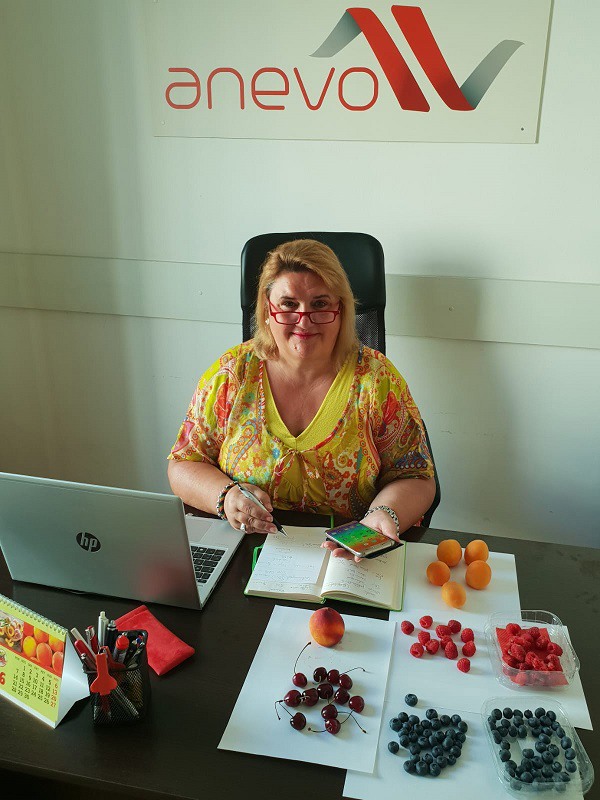Erlangen-based  company Anevo Trading has decades of cooperation for various soft fruits with Eastern European countries such as Poland, Serbia and, since last year, Ukraine. In view of the recent events in Ukraine, Managing Director Anneliese Vollweiler (r) is bracing herself for changes in trade with Ukraine and Russia.
company Anevo Trading has decades of cooperation for various soft fruits with Eastern European countries such as Poland, Serbia and, since last year, Ukraine. In view of the recent events in Ukraine, Managing Director Anneliese Vollweiler (r) is bracing herself for changes in trade with Ukraine and Russia.
We earlier published a statement from Vollweiler on the current situation in Ukraine on Friday. She assumes that her main contractual partner, Serbia, will not choose sides for the time being, since Serbia is an EU accession candidate on the one hand, but also cooperates with Russia. Serbia is glad to have overcome its own civil war, she said.
Goods from Ukraine
"We started buying goods from Ukraine last year. But the crux of the matter is that the produce is quite often treated with pesticides, which is why we are very reluctant to buy in large quantities, especially since there is too little control of the goods due to the lack of laboratories," Vollweiler said.
She also criticized the fact that many agricultural chemical producers from Germany and other EU countries would sell pesticides to Eastern Europe and third countries that are banned in EU countries. "This leads to a kind of boomerang effect, so that the sprayed product ends up again ultimately on sale here in the EU." In this respect, she said, produce from Serbia tends to be better, as there are sufficient laboratories and producers also send fruit samples to suitable EU laboratories, but Serbian fruit is also sprayed with agrochemicals.
It is still difficult to assess how cooperation with Russia will develop in the future, he said. "In addition to fruits, we also purchase oils from Russia. Unfortunately, we did not receive the last shipment of sunflower oil from Russia on Monday, as the sanctions ultimately took effect," she reported Tuesday morning. "A large producer of fruit spreads from the EU, which delivers its jams to Russia, even before the sanctions had to accept that its last shipment stood at customs at the border with Russia for 10 days before the truck could continue on its way to Moscow with a lot of 'encouragement', Vollweiler knows. "We sell about 3,000 tons of frozen fruit and about 800-1,000 tons of fresh fruit, mainly stone fruit, every year, which is a good basis for us as an IFS certified broker and our whole team."
Price level for frozen raspberries doubled
"The price level for frozen raspberries is at least twice as high as last year. Currently, about €6.00 per kilo is charged for a delivery to Europe. So a truckload today costs around €120,000 for 20 tons of raspberries. In the past, the price was between €2.70 and €3.00 per kilo," Vollweiler reports. For blackberries, she says, the price increase is even higher: instead of €1.00 per kilo, the price per kilo is €3.50 to €4.00. "Ukraine has too few cold storage facilities, which is why the raw goods are delivered to Poland, as good frozen goods can be produced there. Ukraine is, so to speak, the garden from which Poland can obtain its raw goods. Moreover, Ukraine is a reliable supplier of raw materials."
More robust varieties against climate change
Vollweiler does not expect any major structural change, although fewer raspberries may be sold in the future. "However, there will certainly still be structural changes in response to climate change. This would require the production of new, more robust varieties that can tolerate a lot of heat while consuming little water," Vollweiler says. "Together with an EU food chain, we are currently working on testing new stone fruit varieties on different plantations and in some regions, which we have been planning since last year."
More greenhouse production
Vollweiler can confirm the opinion that there will be more greenhouse crops in the future. "Both glasshouse productions and production with PVC tubes based on the Dutch model are becoming more and more popular. Especially since with these production methods it is also possible to grow in organic quality, whereas with open field cultures it is still primarily conventional cultivation. In Serbia, we now have berries produced 1000 meters above sea level. There are almost no diseases there, because on the one hand it's rather cool and the wind prevents rot." Vollweiler will fly back to Serbia on March 20 to see how the plantations are doing and prepare for the 2022 fruit season.
For more information: Anneliese Vollweiler
Anneliese Vollweiler
ANEVO Trading GmbH
Fraunhoferstraße 16
D-91058 Erlangen
Tel: +49 (0) 9131 6108673
Tel: +49 (0) 170 581 7970
info@anevo.de
anevo-trading.com
